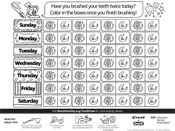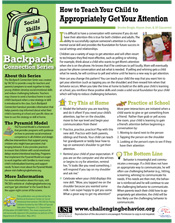
Useful Web Resource Links for Families
Listed below are some websites that provide information that may be useful to parents.
Governmental and Municipal Information
Suffolk County Division of Services for Children with Special Needs
Nassau County Division of Services for Children with Special Needs
Creative Curriculum
CREATIVE CURRICULUM parent booklet
Information for Families
Parent to Parent of New York State
Dental Health
Brushing Calendar calendario de cepillado eng spanish
Backpack Connection Series
The Backpack Connection Series was created to provide a way for teachers and parents/caregivers to work together to help young children develop social emotional skills and reduce challenging behavior. We hope you find them useful.
How to Teach Your Child to Appropriately Get Your Attention & ESPANOL
How to help your child have a successful bedtime & ESPANOL
How to use visual schedules to help your child understand expectations & ESPANOL
How to give clear directions & ESPANOL
How to help your child have a successful morning & ESPANOL
How to help your child learn to share & ESPANOL
How to help your child learn to trade & ESPANOL
How to help your child manage time and understand expectations & ESPANOL
How to help your child recognize & understand frustration & ESPANOL
How to help your child recognize and understand anger & ESPANOL
How to help your child recognize and understand jealousy & ESPANOL
How to help your child recognize and understand sadness & ESPANOL
How to help your child recognize disappointment & ESPANOL
How to help your child stop biting & ESPANOL
How to help your child stop whining & ESPANOL
How to help your child transition smoothly between places and activities & ESPANOL
How to help your child understand and label emotions & ESPANOL
How to plan activities to reduce challenging behaviors & ESPANOL
How to understand the meaning of your child's challenging behavior & ESPANOL
How to use positive language to improve your child's behavior & ESPANOL
How to Help Your Child Recognize and Understand Fear & espanol
How to Help Your Child Stop Hitting and Pushing & espanol
How to Use Social Stories to Teach Your Child New Skills and Expectations & espanol
How to Teach Your Child to Take Turns & espanol
How to Help Your Child Avoid Meltdowns & espanol
Toilet Training - An AFC Parent Workshop
This workshop is intended to help you learn a toilet training protocol designed to make the greatest improvements in your family’s life. Toilet training is a rite of passage that parents, caregivers, and children typically pass through when youngsters are between the ages of 18 months and 3 ½ years. Managing a child’s toileting doesn’t get easier with their age. The longer you delay toilet training, the longer it will take to achieve continence, and the longer the individual will depend upon caregivers for toileting needs.
Toilet Training-Parent-Family-Workshop-PowerPoint
TOILET TRAINING TRACKING SHEET
TOILET TRAINING TRACKING SHEET 2
Some very useful information on the language of Special Education
CRACKING THE CODE - Understanding the Language and Acronyms of Special Education
parent tips for parent teacher conference Padres y maestros conferencia
These links to other internet sites are not owned, operated, controlled or reviewed by Alternatives For Children. These links are provided solely as a courtesy and convenience to you, the visitor. We appreciate any feedback you may have on these links. Alternatives For Children, it's officers or employees, exercise no control over the websites, the organizations, views, or the accuracy of the material contained on the websites and do not sponsor, endorse, or approve the information, content, proceeds, materials, opinions or services contained on such external sites. The visitor proceeds to those external sites at their own risk. Alternatives For Children specifically disclaims any and all liability from damages, which may result from the accessing of a third-party site, which is linked to Alternatives For Children’s site, or from reliance upon such information.
Home > Family Resource Links



